Comfort food can be something simple, complex, rich, healthy or downright indulgent! There is no right or wrong kind of food when it comes to comfort food. Any meal that conjures up feelings of joy and safety, memories of childhood or good times, or brings simple pleasure is what comfort food is all about. If you are feeling lonely, food can be your new best friend; if bored, let food be your entertainment; if you are stressed, food can be your luxury spa treatment. Whatever the feeling, you can seek help through comfort foods.
Whenever I seem to be having a bad week or I just cannot seem to find something to focus on, I can always rely on certain food to cheer me which makes every problem, stress and heartache melt away like a dew drops in the morning light! In the end those supposed problems I thought I had did not really matter at all… Food, at that moment, is also the friend who never disappoints or lets me down! May be that’s the reason why comfort food is called as ‘social surrogate’, as they do not quite replace real companions, but reminds us of them! And it’s not just me. Researchers suggest that when we associate foods with happy memories, the effects are profound, impacting how good we think foods taste as well as how good those foods make us feel.
One such food that I find solace in is a bowl of Punjabi Kadhi Pakoda; a delicious and creamy yogurt-chickpeas curry with onion fritters flavoured with basic spices, garlic and ginger. The recipe for this Punjabi Kadhi Pakora is adapted from good friend Dassana Amit’s Veg Recipes of India. I have tweaked the ingredients and also, cooking technique to suit our taste buds. As with any recipes, there are few things to keep in mind when making this Punjabi Kadhi Pakoda. First, the yogurt should be sour and preferably full fat. I keep the yogurt outside in room temperature a day before making the kadhi for at least 8 hours. Alternatively, if you are short of time or if the yogurt is not sour, you can add amchur or dry mango powder.
Dassana’s original recipe calls for deep frying the pakodas in mustard oil as it lends pungent flavour. I have used sunflower oil for deep frying and have used mustard oil for tempering the spices. Make sure you use the fresh and best quality of gram flour when making Punjabi Kadhi Pakora. If you are health conscious, you can bake or airfry the pakodas instead of deep frying. I prefer crispy pakodas with less water or no water in batter as they do not become too soggy and disintegrate when served next day. But if you prefer softer pakoras, add about ½-¾ cups of water when making pakoda mix. Make sure you add the pakodas just before serving as the softer, airy pakodas will become pretty soggy and mushy if added earlier and will lose its texture.
Keep these key points in mind and you will have one of the best soul satisfying comfort foods. The combination of the simple and fuss-fee flavours is like having a party in your mouth. The bright yellow hued curry is such a mood lifter even on a damp and cold day like today! The sun may have disappeared behind the rain laden dark clouds, but this golden Kadhi Pakoda is like a sunshine in a bowl. Served with a steaming bowl of Basmati rice, the Kadhi Pakoda is the epitome of comfort food; food that has a healing, unexplainable, even magical quality. Please do try this recipe and let me know if you like it. If its comfort food that you are craving today, then let it be this delicious, creamy and delicately spiced Punjabi Kadhi Pakoda; you own sunshine in a bowl!
Punjabi Kadhi Pakoda (Onion fritters in a delicately spiced creamy yoghurt gravy)
Prep Time: 10 mins
Cooking Time: 30 mins
Recipe Level: Easy to Intermediate
Spice Level: Low to Medium
Serves: 5-6 People
Recipe Adapted From: Veg Recipes of India
Shelf Life: Best served fresh but can be refrigerated for 2-3 days
Serving Suggestion: With plain rice or with Jeera Rice or with roti or paratha
Ingredients:
For Pakoda:
1 large or 1 packed cup Onion, peeled and thinly sliced
1 cup Besan/Gram Flour
¼ tsp Haldi/Turmeric Powder
½-1 tsp Red Chilli Powder (Adjust as per taste)
½ tsp Garam Masala
½ tsp Ajwain/Carom Seeds
½ tsp Jeera/Cumin Seeds
2-3 tbsp Coriander Leaves, finely chopped (Optional)
Salt to taste
Oil for deep frying
For Kadhi:
2 cups sour Yogurt, whisked (Read notes)
½ cup Besan/Gram Flour
1 medium Onion, peeled and finely chopped
1 inch Ginger, peeled and finely chopped or grated
5-6 large cloves of Garlic, peeled and thinly sliced
1-2 Green Chillies, finely chopped (Optional and adjust as per taste)
1 tsp Sugar (Optional)
Salt to taste
2-3 tbsp Coriander Leaves, finely chopped (Optional)
Spices Used for Kadhi:
1 tsp Haldi/Turmeric Powder
½ - 1 tsp Red Chilli Powder (Adjust as per taste)
½ + ½ tsp Garam Masala
For Tadka/Tempering:
1 tsp Mustard Seeds
1 tsp Jeera/Cumin Seeds
½ tsp Methi/Fenugreek Seeds
¼ tsp Hing/Asafoetida
2-3 Dry Red Chillies
1-2 springs of Curry Leaves
1 tbsp Oil (Preferably mustard oil)
Preparation:
For Kadhi, finely chop the onions, ginger, green chillies and garlic and set aside.
Sift the gram flour into a large mixing bowl to remove any lumps. To this, add turmeric powder, red chilli powder, a generous pinch of hing, ½ tsp garam masala, finely chopped or grated ginger, sugar if using and salt to taste. Add yogurt and whisk them to get a lump free, smooth mix. Add about 2½ - 3 cups of water and whisk again to get a lump free mixture. If the yogurt is not sour enough, add about ½ -1 tsp Amchur/Dry Mango powder and mix it well.
If you find any lumps, break them with a help of a wired whisk or ladle or with fingers. Remember that the kadhi mixture should be lump free and smooth. You can use the hand blender to whisk the yogurt mixture, but make sure not to whisk it too much. Set it aside until needed.
For Pakoda, peel and cut the onion into two halves. Slice each halves into thin slices and place them in a mixing bowl. Sprinkle salt to taste and mix them well. Set it aside for 5 minutes for the onions to release its water.
Add carom seeds, cumin seeds, turmeric powder, red chilli powder, garam masala, finely chopped coriander leaves and gram flour. Mix them well with hands by squeezing the onions. Add a tbsp. of water at time to get a fritter paste. Make sure it’s not too runny. I just needed about 2 tbsp. of water to get the fritter paste as the water released from onions were enough to make the paste. Set it aside until needed.
Proceed to cook:
Prepare the Pakodas:
Heat oil for deep frying the pakodas. To test if the oil is hot enough, drop a piece of onion slice into the hot oil. If the onion slice sizzles and floats to the surface, then the oil is ready for deep frying. If the piece sinks to the bottom of the pan, then wait for couple more minutes for the oil to heat.
Once the oil is ready, pinch a small lime sized pakora mix and shape it into ball and gently drop it into the hot oil one at time. Deep fry on medium flame for about 2 minutes until they turn golden brown before turning them over and let them fry on the other size until they turn golden brown from all sides. Deep fry about 4-6 pakodas in batches and try not to over crowd the kadai/wok with too many pakodas. It takes about 4-5 minutes per batch.
Remove the pakodas with slotted spoon and place them in a plate or tray lined with kitchen towels to absorb excess oil. Repeat and deep fry all the pakodas.
Prepare the Kadhi:
As the pakodas and deep frying, prepare the kadhi by seasoning the mustard oil. I use a large pan or pot to make the kadhi to prevent the kadhi from spilling as it cooks and boils.
Heat the mustard oil to smoking point, and reduce the heat to low. Add mustard seeds, cumin seeds, methi seeds, dried red chillies, hing and curry leaves in that order in quick session. As the mustard seeds pops and splutters and the cumin seeds and methi seeds sizzles and changes colour to light brown, add thinly sliced garlic and chopped green chillies and fry then until their edges turn golden brown, about 1 minute.
Increase the heat to medium and add finely chopped onions. Sauté until onions turn translucent, about 1 minute. Add the yogurt mixture and mix them all well. Bring the Kadhi to boil, on medium flame and keep stirring the mixture now and then to make sure that it is lump free and also, doesn’t get stuck to the bottom of the pan. It will take around 14-15 minutes.
Kadhi will thicken as it cooks and if you find the kadhi to be too thick, add about ½-1 cup of water to get the required consistency.
Once the kadhi comes to boil, reduce the heat to low and let it simmer for 7-10 minutes. This will help to remove the raw taste of ingredients and also help in developing the flavour. Turn off the flame.
Assemble the Punjabi Kadhi Pakoda:
Add the onion pakodas to the kadhi and mix it well so that the pakodas are well covered with gravy.
Add garam masala and finely chopped coriander leaves to the kadhi and mix them all well. Cover and pan with lid and let it rest for at least 10 minutes for the pakoda to absorb the kadhi and for all the flavours to blend well.
Gently reheat the Punjabi Kadhi Pakoda before serving it hot with steamed plain rice or Jeera Rice and some papads for crunch. It also goes well when served with roti or plain paratha. Enjoy!
 Asian Recipes
Asian Recipes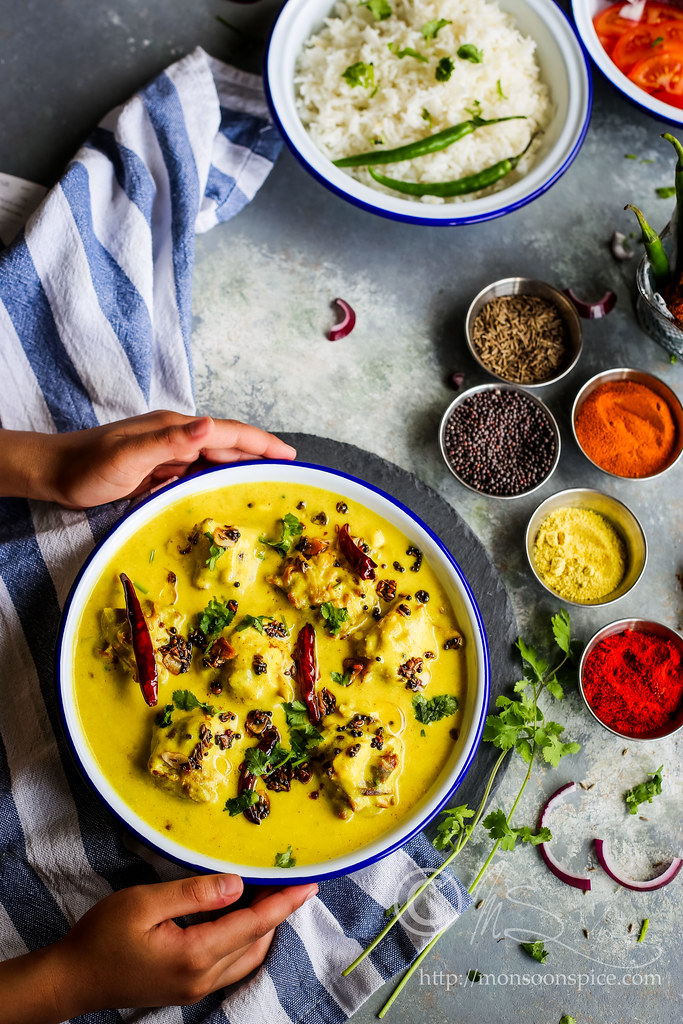
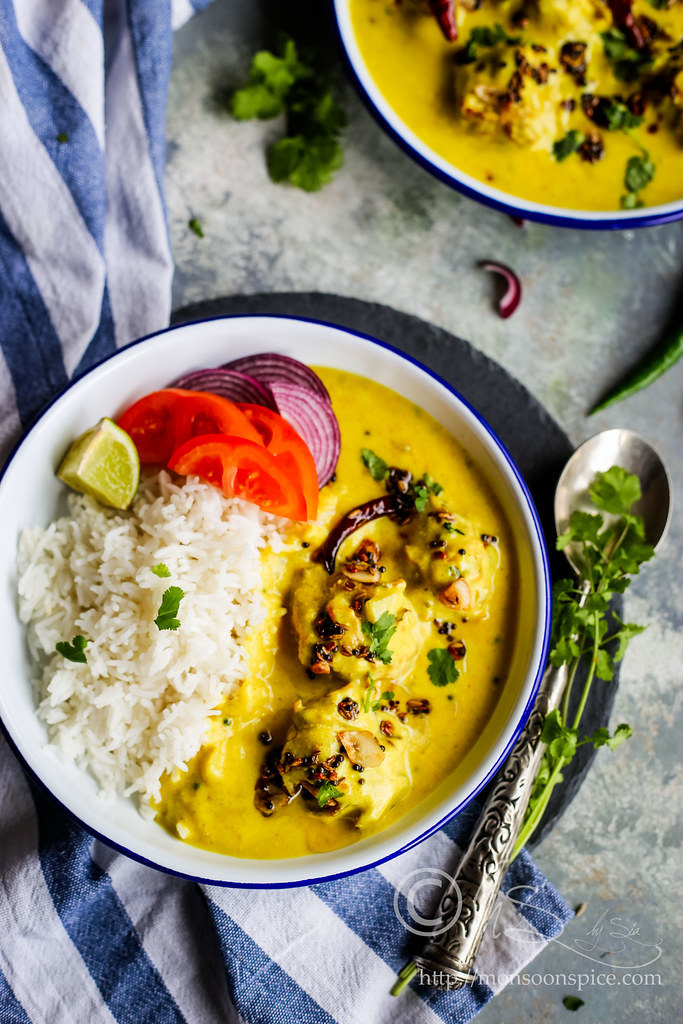

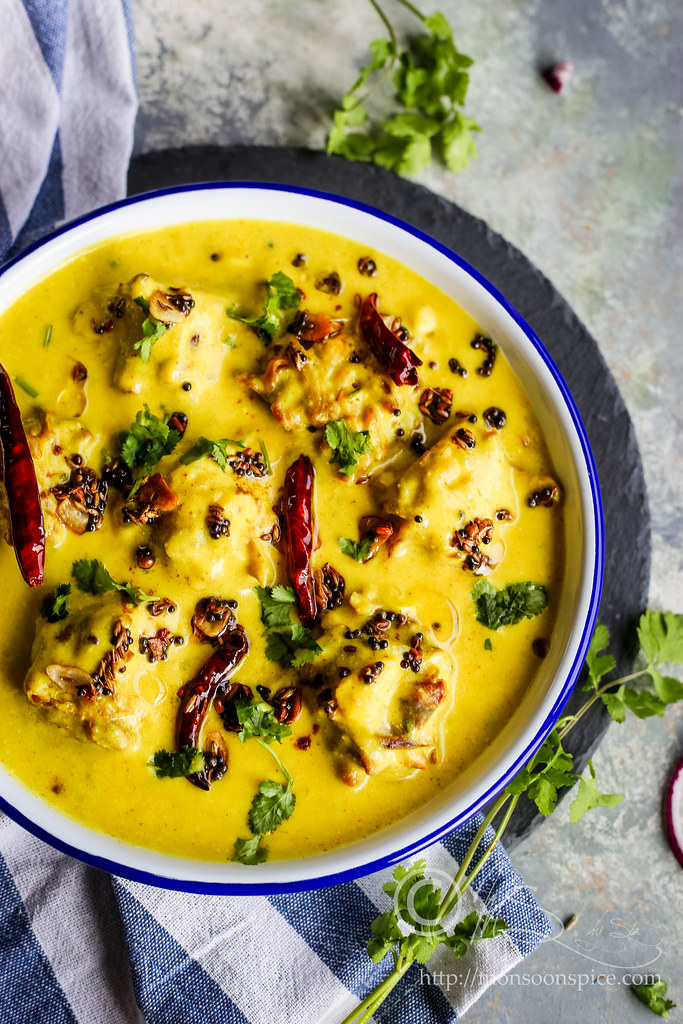
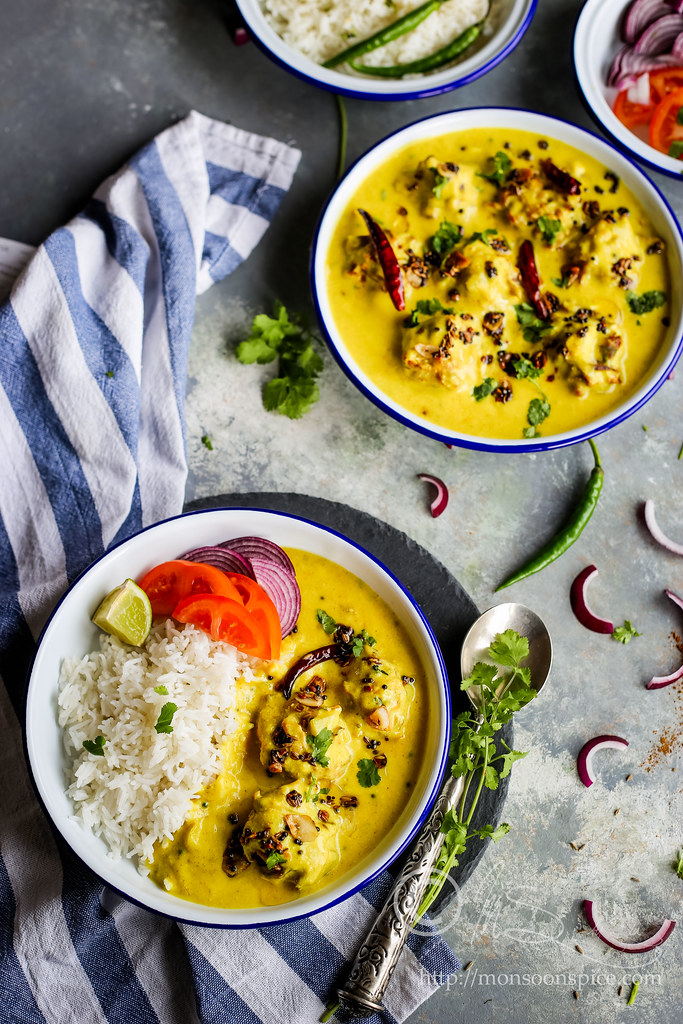
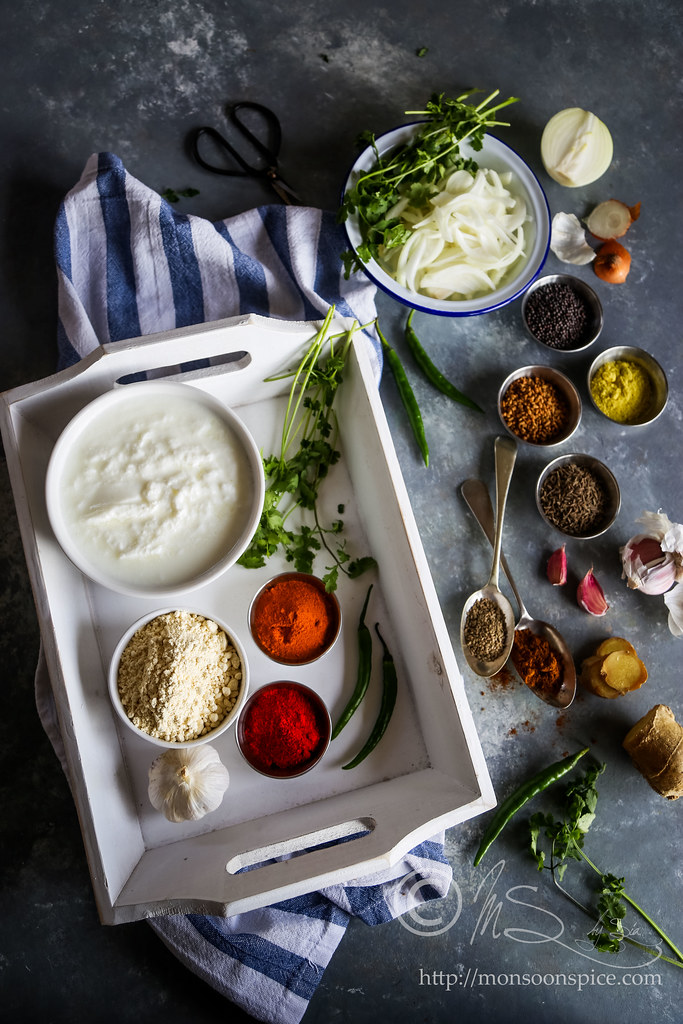
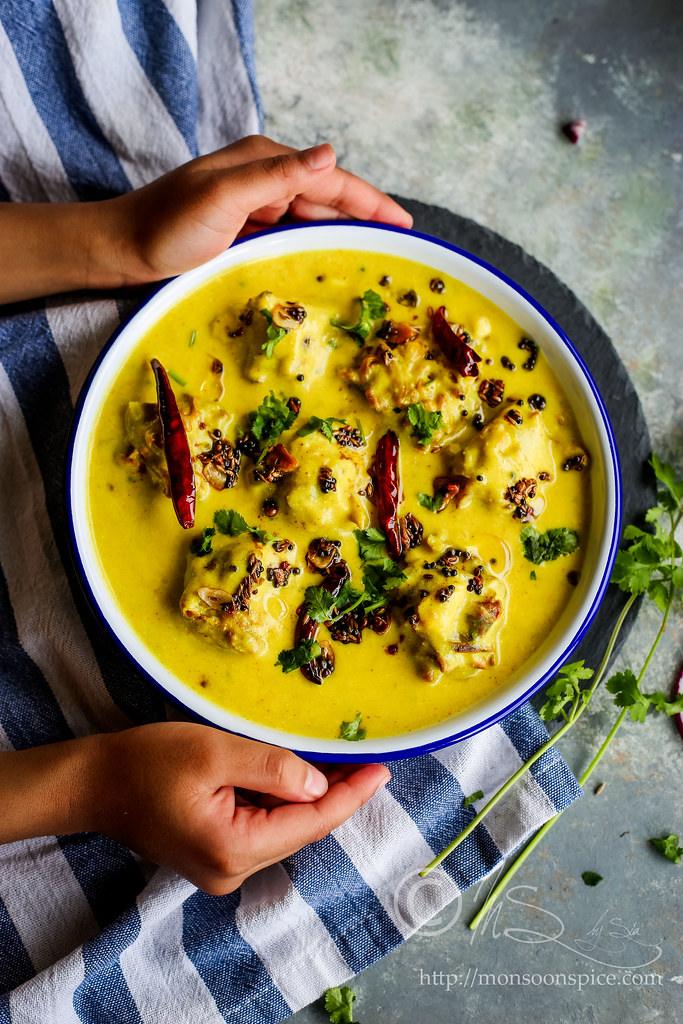
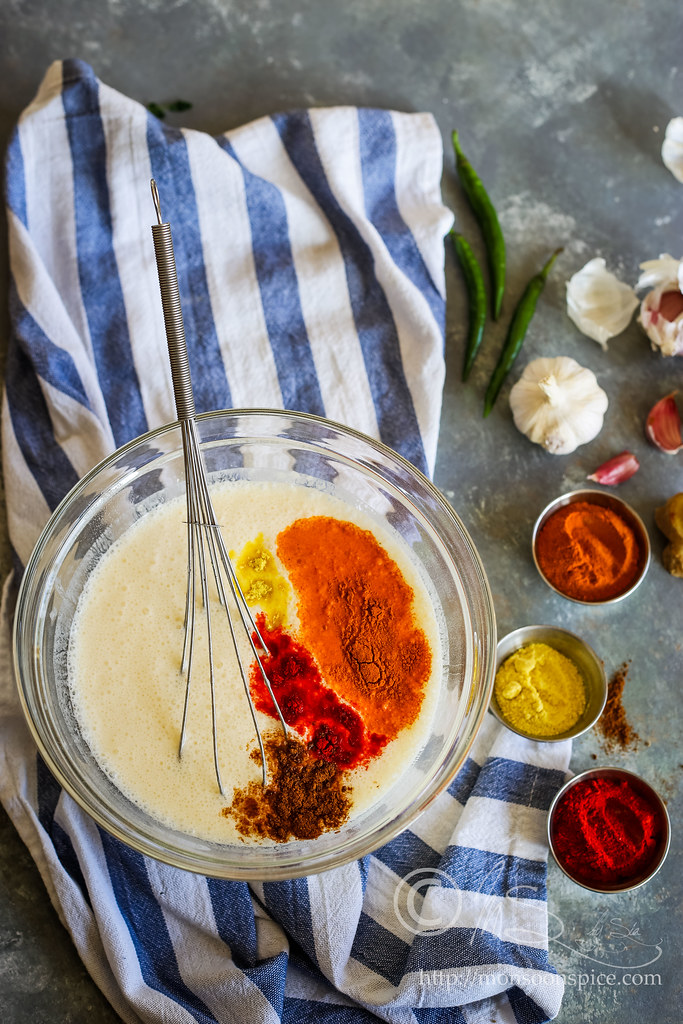
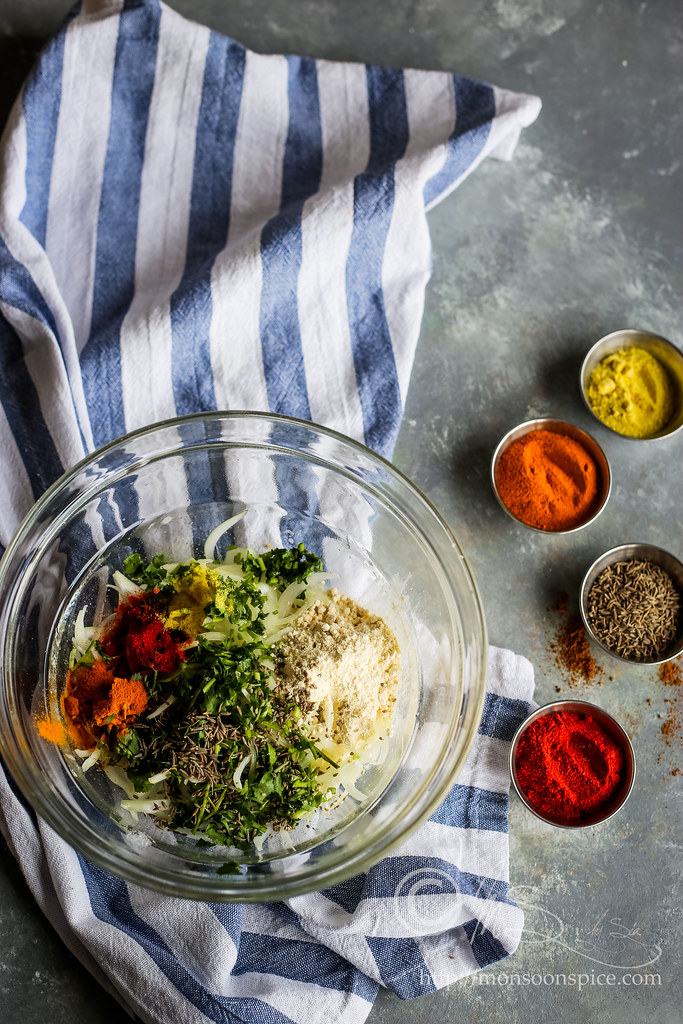
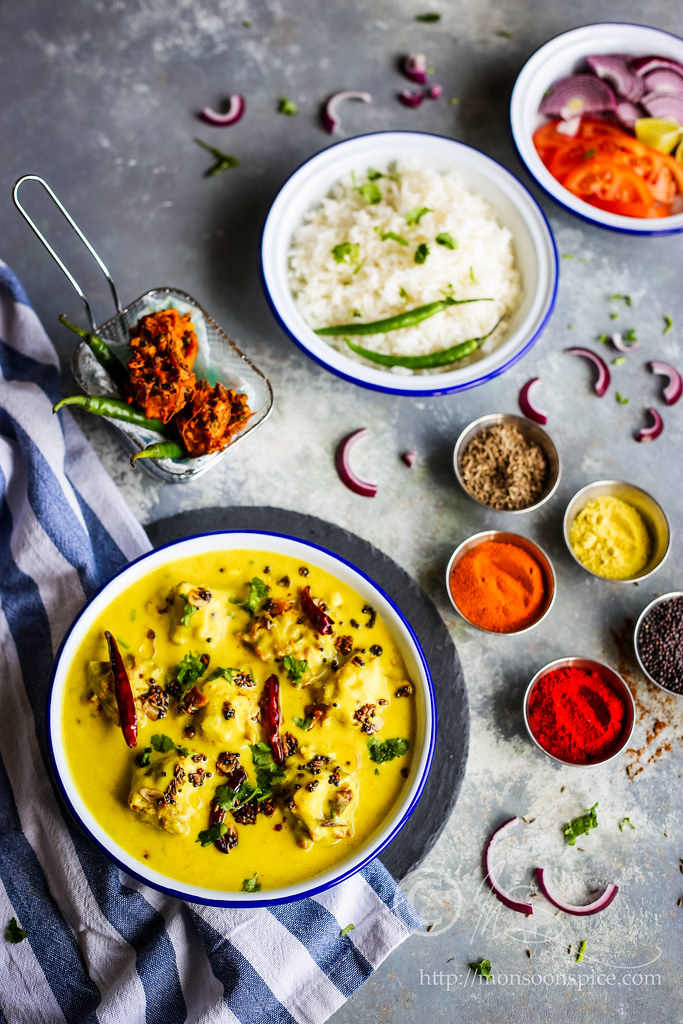
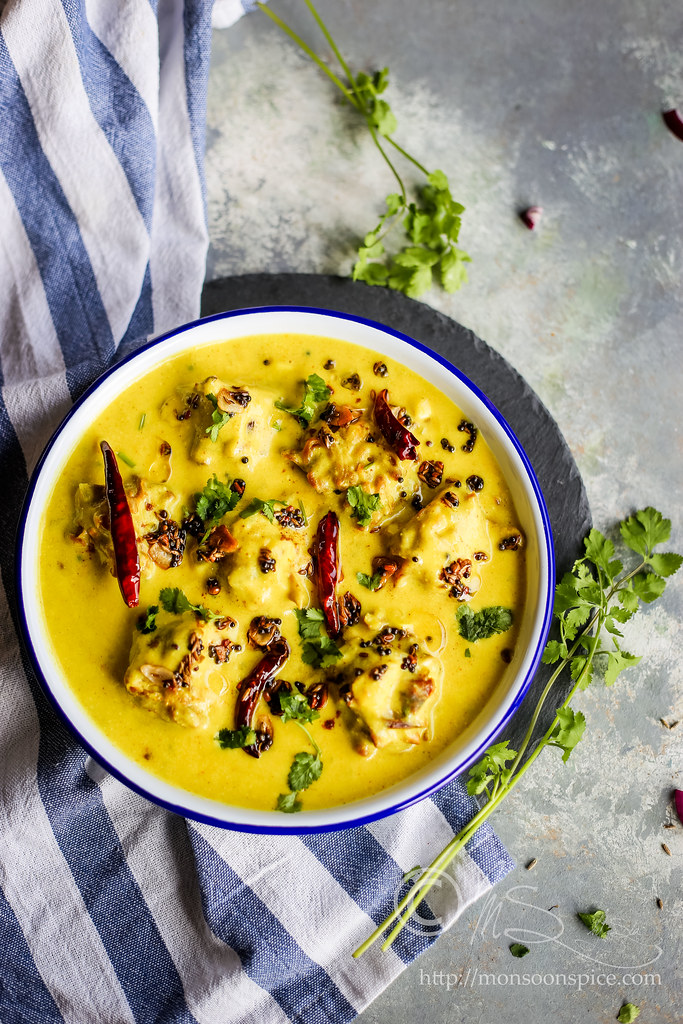
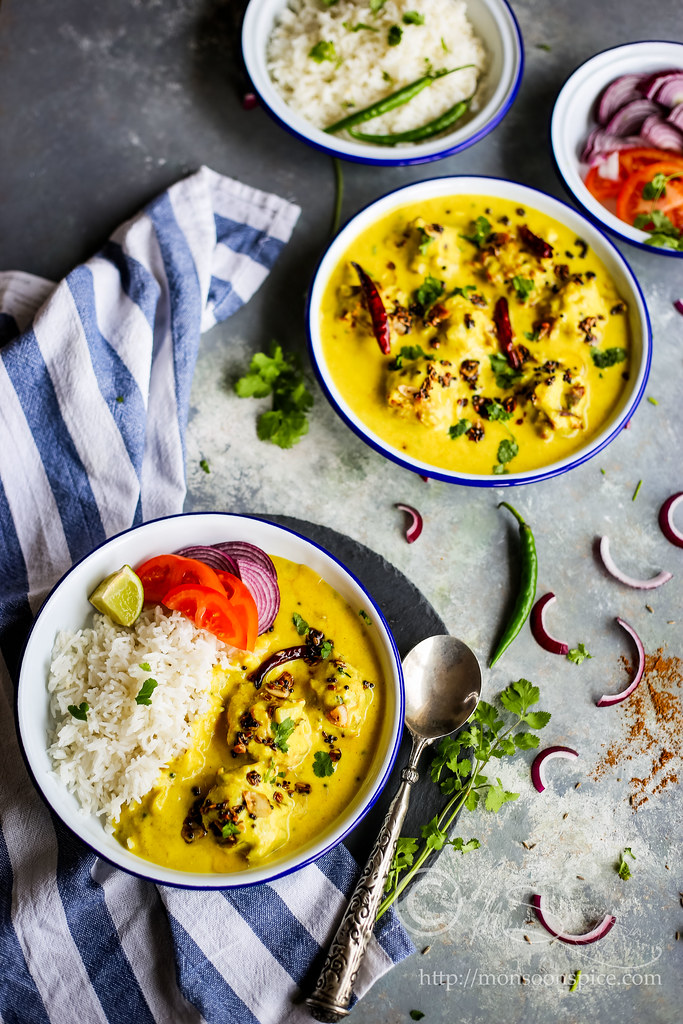
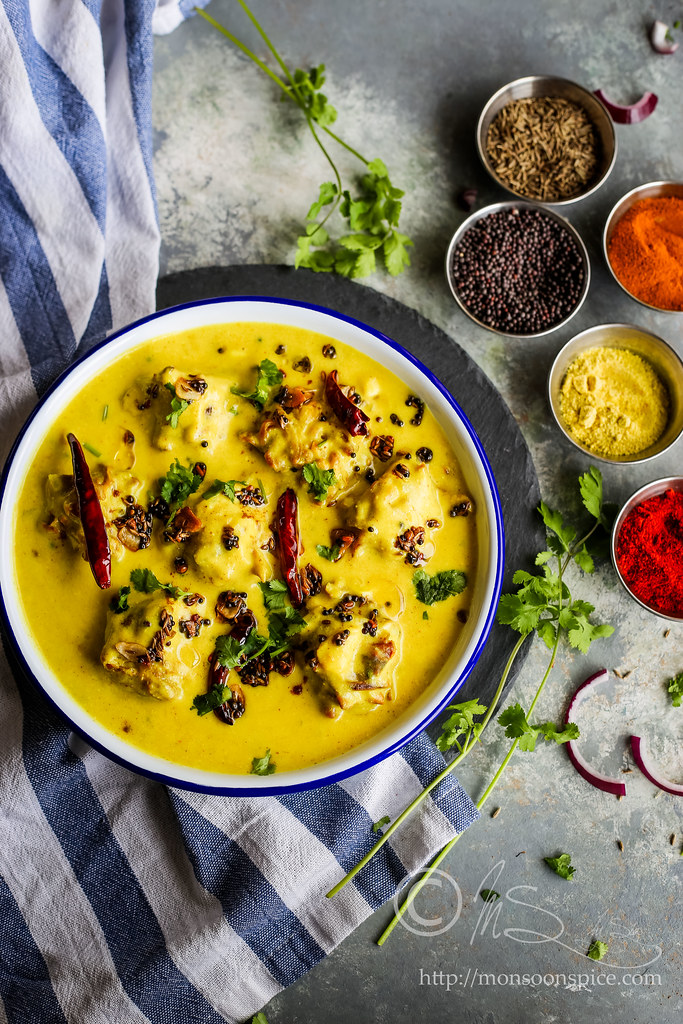
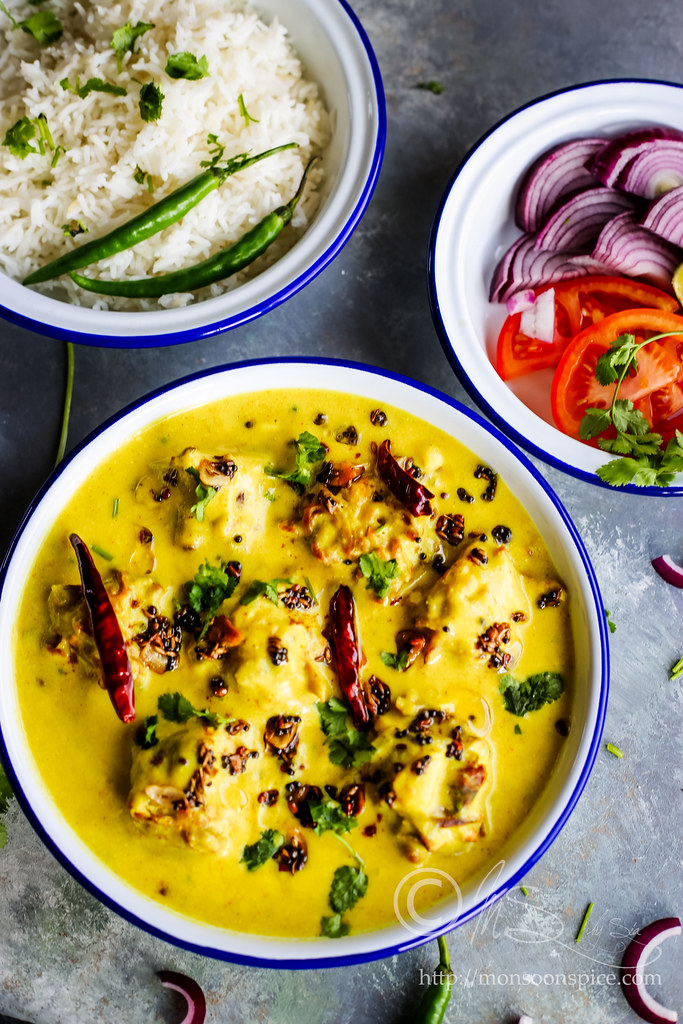
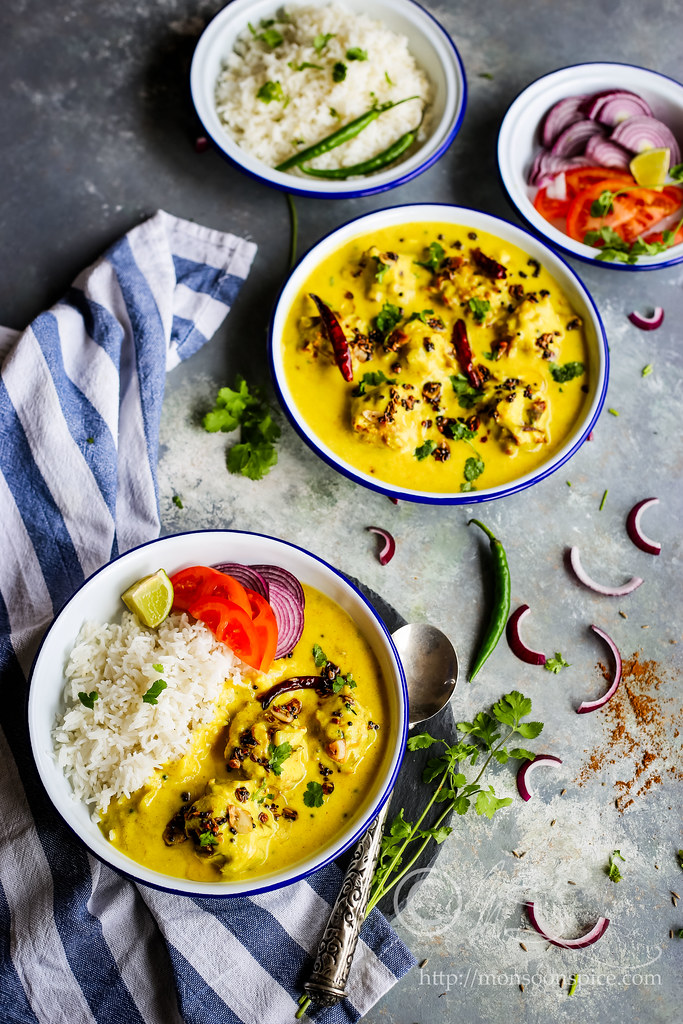





















No comments :
Speak Your Mind: